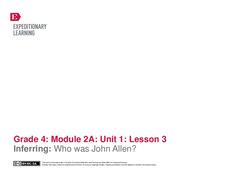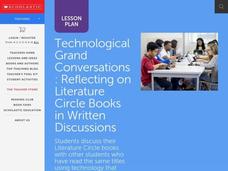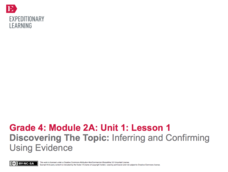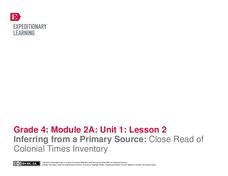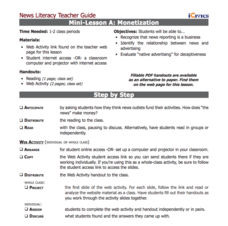Curated OER
Idioms
Use this podcast instructional activity to familiarize scholars with the characteristics, history, and cultural implications of idioms. As part of the Walking Classroom curriculum, kids listen to a 12-minute podcast as they walk around...
EngageNY
Inferring: Who was John Allen?
Help your learners work with difficult or archaic words. A continuation of lesson two of this module, the plan here focuses on deciphering the Inventory of John Allen, in particular the unfamiliar words that make up much of the list. Add...
Curated OER
Active and Passive Voice: Finding Examples Online
Incorporate technological fluency with a search for examples of active and passive voice in online resources. Discuss how use of active or passive voice influences mood or tone and contributes to author's purpose. List of...
Curated OER
Technological Grand Conversations
Conduct a written literary discussion and diminish stress about public writing. Class members, already arranged into literature circles, compose and post responses to novels, signing with initials or class number. The process continues...
Curated OER
Setting the Story: Techniques for Creating a Realistic Setting
“It was a dark and stormy night.” Thus begins the 1830's novel Paul Clifford and, of course, all of Snoopy’s novels! Encourage young writers to craft settings for their stories that go beyond Edward Bulwer-Lytton’s often-mocked phrase...
Curated OER
Identify Base Words and Suffixes to Read Multisyllabic Words #1
Show your scholars how adding an affix changes the entire meaning of a word; they focus on the suffix -able. You'll find a complete script here, but if you don't want to read this verbatim, use it simply as an outline. Learners watch you...
Curated OER
Claims in "The Crisis, No. 1"
"The Crisis, No. 1" is the focus of a series of exercises that ask learners to read closely and annotate Thomas Paine's text. Groups identify claims and evidence in the essay and present their arguments to the class. Teacher background...
Curated OER
The True Confessions of Charlotte Doyle: KWHL
After completing the 11th chapter of The True Confessions of Charlotte Doyle by Avi, take part in a KWHL chart driven by the question,When is it appropriate and admirable to defy authority? Focusing on codes of conduct, scholars...
EngageNY
Discovering the Topic: Inferring and Confirming Using Evidence
Allow your class to figure out what they will be studying through an inquiry-based anticipatory set that involves analysis of mystery documents and practice with making inferences. The lesson plan document includes a detailed description...
EngageNY
End of Unit 1 Assessment: Inferring and Synthesizing (From Two Texts) About Life in Colonial America
Close your colonial America unit with a performance-based assessment. Class members will show their proficiency in several skills including using details to back up inferences, determining the meaning of words in context,...
EngageNY
Taking Notes Using a Graphic Organizer: Inferring About Work and Play in Colonial America
What was life like in colonial America? Follow this lesson and your pupils will find out what people in colonial times did for work and for fun. Ask learners to compare and contrast the two texts and explain what the reading helped them...
EngageNY
Taking Notes Using a Graphic Organizer: Inferring About the Importance of Religion in Colonial America
Improve class understanding of colonial times by reading an informational text and filling out the accompanying graphic organizer. Class members work with a partner to read, take notes, make inferences, and synthesize information.The...
Curated OER
Descriptive Writing Using the Book Rumpelstiltskin
Use the fairy tale Rumpelstiltskin to teach your third grade class about descriptive writing. Following a teacher read-aloud of the story, the class brainstorms a list of adjectives describing the main character. Students use this list...
EngageNY
Inferring from a Primary Source: Close Read of Colonial Times Inventory
Teach your class about colonial America through an examination of primary documents. First though, start vocabulary notebooks for content-specific and academic vocabulary. Pupils can keep this record during the entire module. Once this...
EngageNY
Paragraph Writing: The Role of Religion in Colonial America
Informative writing is emphasized in the standards. Help your learners reach that goal with the plan for paragraph writing outlined here. After reviewing the work from the day before and adding to their vocabulary notebooks, class...
Curated OER
Introduction to Age of Absolutism
Who were the absolute monarchs of Europe and what effect did they have on their countries? Young historians begin by naming qualities they believe are important for a monarch to possess. They then take notes on four key factors leading...
Curated OER
1984 by George Orwell
Readers of Nineteen Eighty-Four engage in a close reading exercise that directs their focus to the key details Orwell provides in the opening paragraphs to introduce his dystopian society. The included worksheeet is divided into three...
Maine Content Literacy Project
Introduction to Ernest Hemingway
What is a white elephant, and what does it have to do with Ernest Hemingway? Study "Hills Like White Elephants" in-depth by following the procedures outlined in this lesson, the fifth in a series of fourteen. Learners start the day with...
Frank Macias Elementary School
Preparing for Guided Reading
Take your guided reading lesson plans to the next level with a collection of printables, templates, and reference tools equipped to support the reading needs of your readers. Included is a detailed information page, grouping sheet,...
Virginia Department of Education
Identifying the Main Idea in Fiction
Discovering the main idea in fiction is like uncovering buried treasure; one must persevere to locate it, and the reward is priceless. Scholars delve deep into leveled stories using three questions to aid in identifying the main idea.
Scholastic
Tell Us a Tale: Teaching Students to Be Storytellers
Encourage scholars to retell their favorite short story or folktale, adding personal details to make it their own. After reading their book of choice several times, story tellers retell a tale verbally to their classmates.
iCivics
Mini Lesson A: Monetization
Advertising is everywhere! Does your class know that their attention span is for sale, even when they're watching a simple news story? The second installment in a five-part series from iCivics examines the relationship between news...
iCivics
Lesson 2: Misinformation
Fake news is a hot topic right now ... but what is it? Intrepid young investigators track down the facts that separate journalistic mistakes and misinformation through reading, research, and discussion. Part three in a five-lesson series...
iCivics
Lesson 3: Bias
How do journalists balance bias and ethical reporting? The final activity in a series of five from iCivics examines the different types of bias and how they affect the news we read. Young reporters take to the Internet to find examples...
Other popular searches
- 5th Grade Language Arts
- 3rd Grade Language Arts
- 4th Grade Language Arts
- Second Grade Language Arts
- English Language Arts
- 1st Grade Language Arts
- Kindergarten Language Arts
- Language Arts Jeopardy Game
- First Grade Language Arts
- Language Arts School Projects
- Language Arts Lesson Plans
- Language Arts Games



